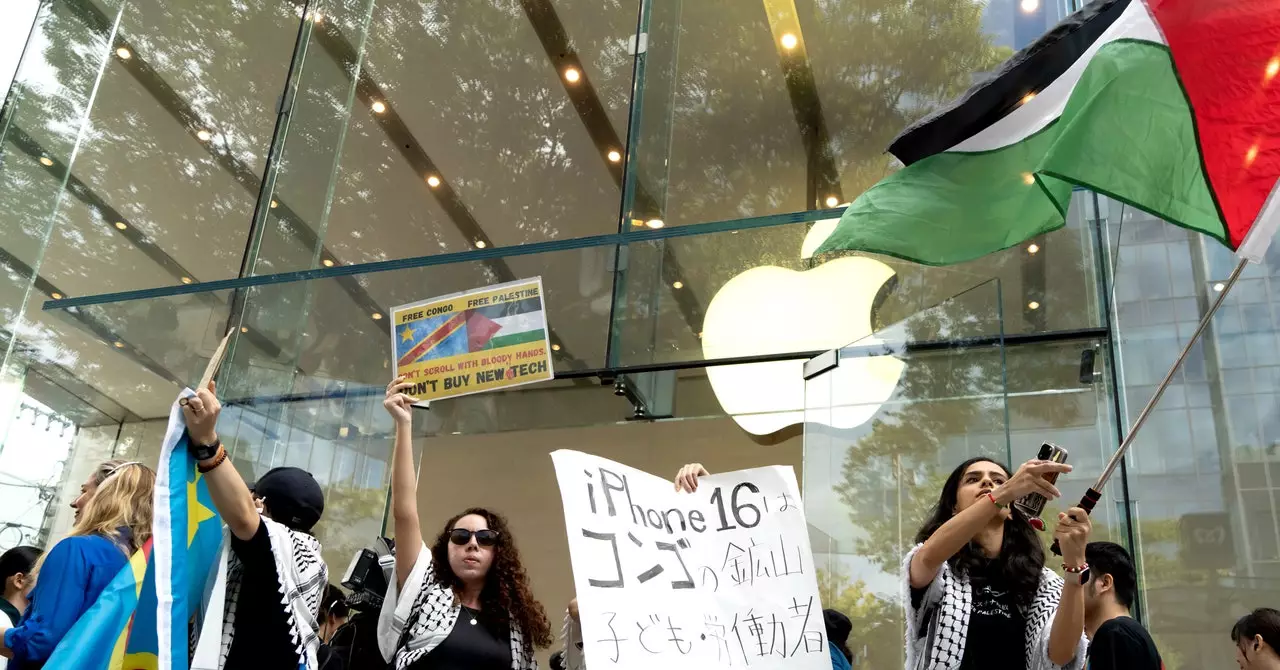On the much-anticipated launch day of the iPhone 16, Apple’s retail stores around the world were buzzing with excitement, as eager customers lined up to get their hands on the latest device. However, the day was not solely marked by consumer enthusiasm; it was also a significant moment that spotlighted pressing human rights issues. In a striking display of dissent, current and former Apple employees organized protests in more than a dozen cities, raising their voices against what they described as the “profiting from genocide” by an industry titan. This juxtaposition of a celebrated product launch and stark social criticism sends a clear message: even the most successful companies must reckon with their ethical responsibilities.
Central to the protests was Apple’s sourcing of cobalt from the Democratic Republic of the Congo (DRC), a country plagued by dire mining conditions. Numerous reports have highlighted the potential involvement of child labor, unsafe working environments, and severe violations of labor rights in Congolese mines. Apple, in its defense, maintains that it has stringent measures in place to avoid sourcing minerals from these problematic areas. Yet, the complexities of tracing mineral supply chains leave room for skepticism about the effectiveness of those measures. Acknowledging “challenges” in tracking these materials, Apple had to eliminate 12 suppliers from its list in 2022 due to these concerns.
The involvement of local activists and global human rights organizations, such as Friends of the Congo, posits that Apple’s assurances are insufficient. They insist that the company must take more decisive action to guarantee that its mineral sourcing does not contribute to the ongoing human rights crises in the DRC. As public sentiment shifts towards demanding corporate accountability, such confrontations are becoming increasingly ordinary within the tech industry.
The protests organized by the group “Apples Against Apartheid” spanned multiple continents, indicating the international resonance of their message. In cities like London, Tokyo, and Berlin, protesters displayed banners and signs outlining the ethical issues tied to Apple’s supply chain. While participation numbers varied, the symbolism of collective dissent was powerful. Notably, Berlin witnessed the largest protest, featuring chants and demonstrations that were met with police intervention.
Interestingly, many of the protesters were not current Apple employees, as the group’s origins suggest; instead, they were allies joining the cause. The intention behind these protests was to highlight Apple’s supposed complicity in human rights violations while disrupting its product launch—a strategy designed to evoke reflection among consumers as they indulged in their purchases. This tactic raises questions about consumer conscience in the face of ethical dilemmas.
In addition to the issues surrounding cobalt mining, protesters also called for Apple’s accountability concerning its stance on the current war in Gaza. Citing the situation as genocidal, they criticized the company for its ongoing silence amidst disturbing humanitarian reports. This demand for action underscores a growing trend of expecting corporations to take moral stances on global issues beyond their immediate business interests.
While Apple is known for its corporate social responsibility initiatives, critics argue that these initiatives often lack teeth. The protests serve not only as an indictment against Apple’s practices but as a wake-up call for consumers to demand further transparency and accountability from tech companies. By engaging with issues that transcend traditional corporate boundaries, these movements are forcing a reconsideration of how businesses perceive their roles in society.
The protests against Apple’s iPhone 16 launch reveal a crucial moment in the intersection of consumerism and social justice. As tech giants like Apple continue to shape global consumer culture, they must also navigate the complex realities of human rights issues embedded in their supply chains. For consumers, the embrace of new technology can no longer come without an awareness of its ethical implications. The voices of activists, whether they carried signs outside gleaming retail stores or rallied in digital spaces, echo a growing demand for systemic change—assuring that the cries for justice cannot be drowned out by the sounds of cash registers ringing. In an increasingly interconnected world, the implications of our choices extend far beyond the products we buy.

